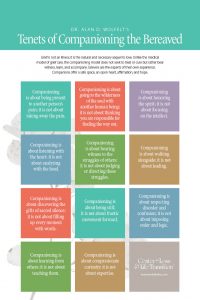By Alan D. Wolfelt, Ph.D.
It was Thomas Moore who observed, “Our science and technologies approach life as a problem to be solved.” This made me reflect on the reality that our therapies approach grief as a pathology to be cured. My hope is that you agree with me that it is time to face the need for change in how we support each other in grief.
To experience and embrace the pain of loss is just as much a part of life as to experience the joy of love. As it should be – thoughts, feelings and behaviors that result from the death of a person who has been loved are impossible to ignore. The experience of grief is very powerful. As we encounter personal loss in our lives, we have the opportunity to make a willful choice of how we are going to use the pain of the grief – whether we are going to channel it to make our lives better or worse.
 At the very heart of companioning is the need to acknowledge each other as equals, not as “therapist” and “patient.” What makes us all equals is that we are all human beings who will come to know the pain and suffering that emanates from the loss of those we have loved. We also need each other.
At the very heart of companioning is the need to acknowledge each other as equals, not as “therapist” and “patient.” What makes us all equals is that we are all human beings who will come to know the pain and suffering that emanates from the loss of those we have loved. We also need each other.
Companioning can only take place among equals. If anyone believes he or she has superior knowledge of another’s journey into grief, this belief destroys the foundation of a relationship anchored in unconditional love. Those who project what I call “superior expertise” can’t help but “treat” the mourner, and usually – consciously or unconsciously – try to achieve some variation of “closure.” When we see each other as equals, we do not misuse each other. Acknowledging each other as equals is a reflection of love.
Companioning is also about compassionate curiosity. When we support each other with this humility, we open our hearts to another human being. Curiosity encourages us to take off our professional masks and create sacred, hospitable-free space for the mourner. It takes time and conscious effort to create this space in a mourning-avoidant culture. Compassionate curiosity encourages us to extend ourselves rather than withdraw into our own worlds. Yes, companioning invites us to open our hearts wide, be still and really listen.
Companioning also depends on our willingness to reject grief as a pathology and not think of our role as eradicating emotional and spiritual suffering. We must surrender to the wilderness to be willing to wander into the mystery. We have to expect chaos, confusion, disorder and even despair. So-called “negative” emotions and experiences are not dangerous. Messiness has its place. Grief loss and change always start with confusion. We can’t be companions if we refuse to be confused. Integration of loss often occurs in the space of not knowing. We don’t need to be joined at the head with a mourner; we need to be joined at the heart.
Just as we are faced with choices in our personal experiences with loss, we also are faced with choices in our life’s work as companions to those in grief. We can choose to help people avoid the work of their grief, or we can support and accompany people as they fully enter into their grief. If we are able to achieve the latter of these choices, chances are we can become catalysts for divine momentum and a renewed sense of meaning and purpose in the lives of our fellow human beings.
I have always been drawn to Robert Frost’s classic poem that, in part, reads: “Two roads diverged in a wood, and I – I took the one less traveled by, and that has made all the difference.” Companioning is not a technique or a therapy, it is a philosophy and a discipline for every hour, every day, every week, every month and every year of your life. For me, the “road taken” is:
- Finding passion and purpose in ministering to those in grief.
- Attending to those things that give my life richness and purpose.
- Having gratitude each day for my family and friends.
- Trying to fulfil my destiny, by developing my soul’s potential.
- Striving to “give back” what others have given to me.
- Observing what is requesting my attention, and giving attention to it.
- Going out into nature and having gratitude for the beauty of the universe.
- Praying that I’m living “on purpose” and using my gifts whether by writing a book, teaching a workshop or caring for my children.
- Going through my own struggles with grief and realizing that it is working through these wounds that helps unite me with others.
Every day we each have the opportunity to be companions, to listen with our hearts, and to be curious rather than certain.
TenetsofCompanioning_24x36To download this poster, click here: TenetsofCompanioning_24x36
CLICK HERE TO JOIN AFTERTALK
Free, Non-Profit and Non-denominational
Every Wednesday we will be publishing Pandemic Weekly for, we hope, not too long. We invite you to submit your thoughts, essays, poems or songs. Please send to info@aftertalk.com. To see past Pandemic Weeklies, CLICK HERE

